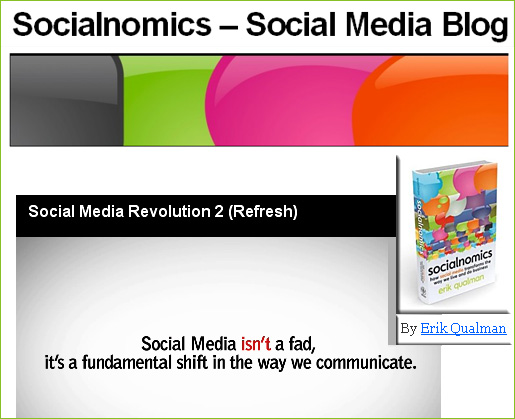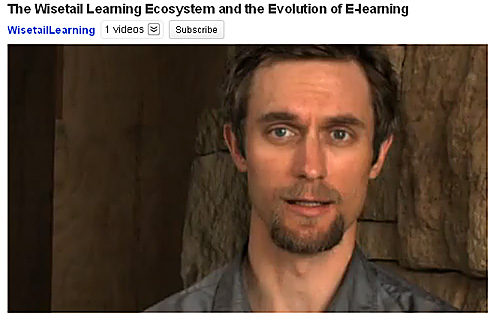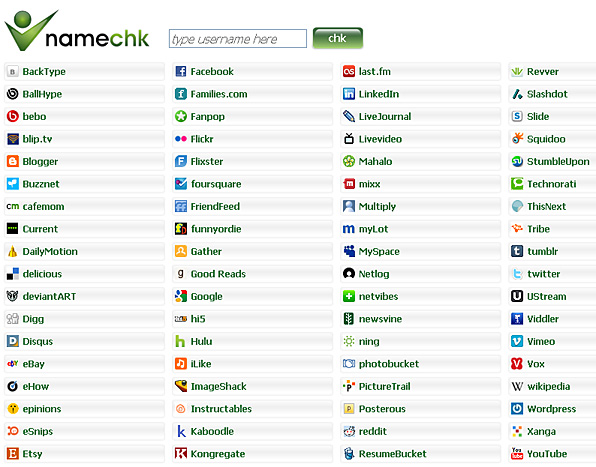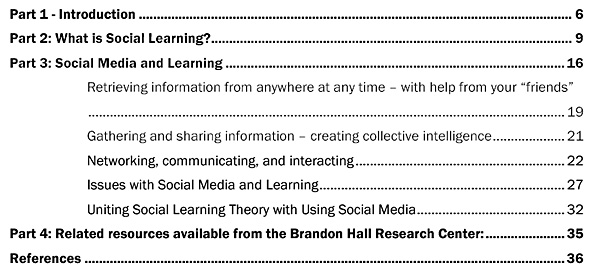Social Media Revolution 2 (Refresh) — from Erik Qualman [via G. Siemens]
Per George:
Erik Qualman’s socialmedia revolution video has been updated. He starts by asking: “Is social media a fad? Or the biggest shift since the industrial revolution?”. While the stats provided are interesting, his questions mistake the effect for the cause. It’s like asking, 150 years ago, “is the railway a fad? Or the biggest shift since the agricultural revolution?”. Of course, the railway was part of the industrial revolution. But it was needed largely because of other trends (economic, societal, technological innovation, etc.). In the same sense, social media is an expression, a carrier, of fundamental changes around information and interaction. It is not, however, the change itself. Three years ago, I communicated a similar concept in It’s not about the tools. It’s about the change*.
*In that posting George states:
It’s the change underlying these tools that I’m trying to emphasize. Forget blogs…think open dialogue. Forget wikis…think collaboration. Forget podcasts…think democracy of voice. Forget RSS/aggregation…think personal networks. Forget any of the tools…and think instead of the fundamental restructuring of how knowledge is created, disseminated, shared, and validated (emphasis DSC).
But to create real change, we need to move our conversation beyond simply the tools and our jargon. Parents understand the importance of preparing their children for tomorrow’s world. They might not understand RSS, mashups, and blogs. Society understands the importance of a skilled workforce, of critical and creative thinkers. They may not understand wikis, podcasts, or user-created video or collaboratively written software. Unfortunately, where our aim should be about change, our sights are set on tools. And we wonder why we’re not hitting the mark we desire. Perhaps our vision for change is still unsettled. What would success look like if we achieved it? What would classrooms look like? How would learning occur? We require a vision for change. It’s reflected occasionally in classroom 2.0 or enterprise 2.0 projects. But the tool, not change centric, theme still arises. We may think we are talking about change, but our audience hears hype and complex jargon.
What is your vision for change?
Introduction to Team-based Authoring (webinar)
Streamline training development & delivery (emphasis below from DSC)
- Leverage a scalable, flexible platform that enables anyone to contribute
- Alleviate the burden on SMEs and instructional designers to create, manage, and deliver all learning content
- Collect knowledge and ideas from members to incorporate into formal learning courses
- Ensure diverse perspectives in learning materials, rather than the singular view of individually developed courses
- Supplement interim periods between formal learning events with a member-created, continually evolving knowledge base of best practices, FAQs, etc.
About Mzinga
Mzinga is the leading provider of social software, services and analytics that improve business performance. Through a combination of enterprise-class technology, strategy and online moderation services, Mzinga social solutions enable businesses to increase revenue and lower costs by improving brand visibility, workplace satisfaction, and customer loyalty. With 14,000 communities under management, Mzinga services more than 1 billion monthly page requests from 40 million unique visitors in 160 countries worldwide.
100 inspiring ways to use social media in the classroom — from onlineuniversities.com
Notemonk, innovative Indian website combining open textbooks and social learning — from reganmian.net
Effective group work strategies for the college classroom — Faculty Focus (free report)
Group work is an effective teaching strategy whose lessons often endure well beyond the end of the course. So why do so many students (and some faculty) hate it?
This special report features 10 insightful articles from The Teaching Professor that will help you create more effective group learning activities and grading strategies, as well as deal with group members who are “hitchhiking” (getting a free ride from the group) or “hijacking” (dominating the group effort).
A sampling of the articles you will find in this report include:
Leaders with Incentives: Groups That Performed Better
Dealing with Students Who Hate Working in Groups
Group Work That Inspires Cooperation and Competition
Understanding the Group Exam Experience
Use the Power of Groups to Help You Teach
Pairing vs. Small Groups: A Model for Analytical Collaboration
College Students Addicted To Social Media — from CTI Career Search
From DSC:
If this is true, does it change our pedagogy? How can we harness this hunger for social networking? Or should we take other steps to fight/try to prevent the addictions?
Justin Bigart, Founder + President
Wisetail / The social side of e-learning
www.wisetail.com / www.learningecosystems.com
From DSC:
While listening to Justin, several things that he said jumped out at me:
- Learning is social
- Audience engagement is critical
- The definition of what is considered training content has to evolve and should be more conversational in nature; more of this material needs to be created by the people in your organization who are interacting with your clients
- Your audience is changing
Also:
- Use video-based content, built around storytelling
- Use people within your organization that are the best at that act or who model that behavior or who are the ambassadors of the concept that you are trying to relay/implement
- Make it raw, real, unscripted
- Use socially-aware technologies and layer that with advocacy-based / video-based training
Ning news highlights need to pick online tools wisely — from Converge by Tanya Roscorla
From DSC:
This highlights a very real problem. What are those Ning-based collaborative groups going to do now? My guess is that some of these groups (those with deeper pockets) may decide to ante up; others may pursue getting sponsors or seeking grants/foundation $$…but many will not do these things and will seek out alternatives. Hopefully, Ning won’t charge too much…
“Check to see if your desired username or vanity url is still available at dozens of popular Social Networking and Social Bookmarking websites. Promote your brand consistently by registering a username that is still available on the majority of the most popular sites. Find the best username with namechk.”
From DSC:
My thanks go out to Mr. Logan Kuntz in the Teaching & Learning Digital Studio at Calvin College for this link. Also, notice how many social networking/bookmarking sites are listed (and I’m sure there are many more out there as well). Wow.
My top 10 social learning blogs — by Jane Hart
Social Learning = New Toolset + New Mindset + New Skillset — from Jane Knight
Seel also:
http://c4lpt.co.uk/handbook/newset.html
Original resource from Paul Simbeck-Hampson:
Social Learning = New Toolset + New Mindset + New Skillset by Jane Hart < re-reading
What is social learning and how do I teach with it? — from Learning Objects’ Nancy Rubin
















